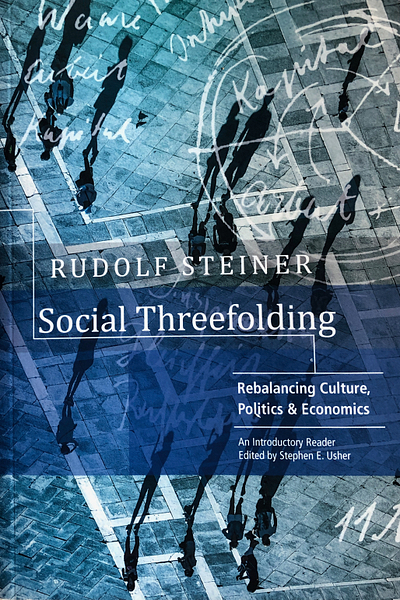There are countless ways that we try to bring health to society, yet they almost always address one issue without seeing the whole. But society can’t be made healthy this way. It keeps changing, evolving. We can’t renew it without grasping the lawfulness of its evolution and the dynamic relationship of its parts.
“The individual stone is useless if it does not fit into the overall (building) plan. Reform the law, religion, or anything else — as long as you only take account of the particular item, without having an understanding of the whole, it only results in demolition…
All separate reform movements — emancipators, abstainers, vegetarians, animal protectors and so forth — are only useful if they all work together.” — Rudolf Steiner
But developing such an understanding is difficult. Rudolf Steiner, who worked tirelessly to make the wholeness of society visible (work that he called “social threefolding” because it addressed the relationship of the economy, government, and culture), left behind a vast trove of books and lecture cycles. But starting with a hefty book can be daunting. So what are some other ways?
The Whole Social is one such way, one that starts with the current events around us. But what are the best doorways out of Steiner’s work itself?
Below is a collection of articles that are all great starting points because of their brevity, scope, and power. They’re accessible and also provocative. They’re juicy. In addition, some are about topics that are harder to come by from a threefold perspective, so folks already immersed in threefolding may be especially excited to discover them. (In order not to overload this “starter kit,” I’ve created a separate “More Resources” page for anyone interested in additional articles.)
I hope you enjoy!
(PS — below these articles I’ve also shared some of the books that I think are the best to start with, as well as a few other related resources.)
(PPS — there’s one translation issue to be aware of when reading. The word that Steiner uses to describe the life of culture is “Geistesleben,” which also means the life of the mind, intellect, or spirit. This can be confusing because any of these terms might be used in any given translation.)

4th Preface to "Towards Social Renewal" by Rudolf Steiner
7.04MB ∙ PDF file
This short preface to Steiner’s basic book on threefolding, “Towards Social Renewal,” gives a great overview of some of the key insights from the book. Though he leaves the details of many of his observations to the book itself, nonetheless this preface serves well as a basic preview to stimulate further interest.
Download
"Land, Means of Production, & Commodities" by Rudolf Steiner
4.01MB ∙ PDF file
In these brief remarks at a study group in 1920, Steiner touches on some of the most crucial aspects of threefolding, demonstrating the kind of discernment that needs to be cultivated. Many of his indications are developed more fully elsewhere, but this short piece is a wonderful introduction to the kind of living flow of his thought. In it he elucidates the three most material aspects of economic life - land, means of production, and commodities; the effects of forced migration (displacement); the need to discern the delicate weaving of threefolding - of human rights, needs, and talents; and the abstract nature of money and investment.
[This article is from the journal “The Threefold Commonwealth,” which can be found at the Rudolf Steiner Library in Hudson, NY.]
Download
Steiner on Picturing the Whole Work Process
17.3KB ∙ PDF file
This one-page excerpt is from a recollection of Rudolf Steiner by Herbert Hahn, one of the teachers at the first Waldorf school. In it, Steiner describes how organizations should empower workers to picture the whole of their activity, going so far as to suggest an educational curriculum for organizations.
[This writing can be found in the 1958 issue of The Golden Blade https://www.waldorflibrary.org/journals/164-golden-blade.]
Download
"Culture, Law, And Economics" by Rudolf Steiner
86.1KB ∙ PDF file
One of the best short overviews of threefolding. In it, Steiner describes some of the fundamental imbalances that can occur between the different spheres of society, and the most basic shortcomings that plague us.
[This article can be found in “Renewing the Social Organism.”]
Download
"The Consequences Of Threefolding For Land" by Rudolf Steiner
5.28MB ∙ PDF file
This lecture has land at its focus, yet still touches on other aspects of threefolding in entirely original ways. Some of his topics include: the role that knowledge, laws, and contracts should play in determining culture, government, and economy (and the role of contingency in law); the difference between land and other means of production; seeing through (but still working with) “social lies,” like the commodification of land and our abstract money system; how we must learn to think anew in order to perceive society as an organism; and understanding road traffic in threefold terms.
[This lecture is currently not published in any book. It can be found at The Rudolf Steiner Library in Hudson, NY.]
Download
"Ability To Work, Will To Work" by Rudolf Steiner
1.19MB ∙ PDF file
In this brief article, Steiner challenges the lack of forethought in socialism, pointing to the power of self-interest (egoism) and asking what would replace it in a cooperative, socialist economy. Socialists assume that people will naturally be motivated to work for the whole community, but Steiner contends that the motivation to work selflessly must be actively cultivated in people. Specifically, we need to experience the community that we’re working for - we need to feel its reality - and this can only happen through a proper relationship to culture (through education) and government (through active participation).
[This article can be found in "Renewing the Social Organism."]
Download
"Brotherhood and the Struggle for Existence" by Rudolf Steiner
1.31MB ∙ PDF file
This lecture is one of Steiner’s most important early articulations of social lawfulness. Like most of his early offerings, he plants important seeds for what will be developed later in threefolding. He focuses on the polarity between collaboration and competition (the latter considered the key mechanism in the Darwinian and Capitalist worldviews), and shows where each has its rightful place. In the process, he touches on jurisprudence, medieval guilds, the power that can work through groups, and many other important topics.
[Though other translations of this lecture can be found on the Rudolf Steiner Archives (it’s unfortunately not in any existing books), I think this is the best translation.]
Download
Notes from an 'Esoteric Lesson' with Rudolf Steiner
2.79MB ∙ PDF file
This short lesson (or lecture, the origins are unclear) was given early in Steiner's career. It covers many of the key ideas he brought at that time, as well as some interesting additions: social conditions are born of consciousness, so consciousness must be transformed; suffering is born of egoism; intellectual property; and others. It should be mentioned that these are the notes of one of his listeners - not a proper transcription - so they are not always entirely clear.
[This writing can be found in the collection, "Esoteric Lessons, 1904-1909,” published by SteinerBooks.]
Download
"The Social Question" by Rudolf Steiner
5.18MB ∙ PDF file
A foundational series of two short essays that were originally published as "The Social Question" and "Freedom and Society." Here Steiner describes what he calls "the basic sociological law" ("dem soziologischen Grundgesetz," which is often translated as "the fundamental sociological law").
[These essays was published in 1898 in the Magazine for Literature. They can be found in the original German in GA 31, and in English in the book "Social Threefolding."]
Download
"Spiritual Science And The Social Question" by Rudolf Steiner
8.63MB ∙ PDF file
A foundational series of three short essays where Steiner articulates what he calls "the main social law" ("das soziale Hauptgesetz," which is often translated as "the fundamental social law"). These essays are also known by the title "Anthroposophy and the Social Question."
[They were published in the journal Lucifer-Gnosis in 1905-1906. They can be found in the original German in GA 34, and in English in the book "Social Threefolding."]
Download
Besides these shorter pieces, it’s important to still point out some of the best books on threefolding. At the top of that list would be Rudolf Steiner’s Towards Social Renewal, followed by his Rethinking Economics (variously translated as World Economy and Economics), and then perhaps The Social Future. Also, there are a couple of really great compilations: one consisting of Steiner’s public articles called Renewing the Social Organism, and an especially rich compendium of some of his most important essays and lectures called Social Threefolding (edited by Stephen Usher).
Besides Steiner, there are also a number of other writers who have published on threefolding (mostly in German, but also in English). To go through such a list would take too long, but I’ll just mention two resources I think are under-appreciated: the social writings of Owen Barfield, as well as the body of work that the Economics conference at the Goetheanum has built up.
And for those who are looking for a bit more guidance through these ideas, I’ve written a 12 lesson correspondence course called Transforming Society, which can be taken up by both individuals and groups.
Lastly, some of The Whole Social articles have begun to be translated into foreign languages (so far only into Spanish, but if you’d like to translate any article into another language, please let me know).
Spanish articles

Rudolf Steiner sobre la creación de organizaciones saludables
1020KB ∙ PDF file
A Spanish language translation of the article "Rudolf Steiner on building healthy organizations." This article was generously translated into Spanish by Maria Rosa Costa I Alandi and Bruno Espinace.
Download
Tu trabajo no es una mercancía, le da sentido a tu vida
1.57MB ∙ PDF file
A Spanish language translation of the article "Your work is not a commodity, it's your reason for being here." This article was generously translated into Spanish by Maria Rosa Costa I Alandi.
Download
What do you recommend when people ask, “Where should I begin with threefolding?” If you have further suggestions, please share them in the comments section below.
Support The Whole Social
















This is the way to do it I think - to provide resources that help people to "get into the ballpark", and get a taste that inspires them to exolore further !
Thank you